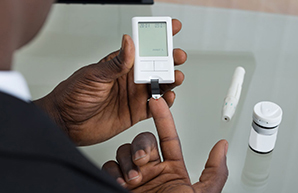Q1: How do I lower my risk of developing diabetes?
Dr Renee Blaauw, a private practising dietitian at Panorama Hospital in Cape Town, recommends the following lifestyle choices to lower your risk:
- Prioritise a healthy, balanced eating plan with, for example, three meals spread evenly throughout the day.
- Control and maintain a reasonable body weight.
- Get adequate exercise to help maintain your weight.
- Don’t overload your body with too much sugar at any one given time.
- Follow the low GI (glycaemic index) concept of eating, to keep your blood sugar levels even.
With lifestyle interventions like these, Gina Fourie, a private practising dietitian in the southern suburbs of Cape Town, adds that research has shown that the incidence of type-2 diabetes, which is more lifestyle related, can be reduced by almost 60 percent.
Q2: I just discovered I have type-2 diabetes – what foods are a must to avoid?
Most health professionals agree that there are no foods that must be avoided completely. Instead, you need to develop healthy eating habits and enjoy foods such as sweets and biscuits in moderation, according to the Nutrition information Centre of the University of Stellenbosch (NICUS).
Q3: I am pregnant and have just been diagnosed with gestational diabetes. What should I do?
“Remember that for the next nine months your baby comes first,” emphasises Dr Blaauw.
“If you have raised glucose levels in your blood, this will cross the placenta to the fetus. The baby will be exposed to this and his or her body will react by secreting insulin. This could result in a very large baby and also increases the chances of this child becoming insulin depleted or diabetic later in life.
“Your healthcare team will probably recommend an eating plan and exercise, and possibly insulin injections to control your blood sugar levels.”
Q4: What advice would you give to parents of children with diabetes?
“You might feel alone after the diagnosis of diabetes,” says Rene Smallberger, President of the Association for Dietetics (ADSA), “but the more one knows about diabetes, the easier it is to control the condition and to live a normal life.”
Diabetes South Africa suggests that families and kids should work closely with a healthcare professional. They advise:
- Developing a personal diabetes plan for your child
- Following a healthy meal plan
- Getting regular physical activity
- Checking blood glucose levels regularly
- Taking all diabetes medication as prescribed.
Q5: Any pearls of wisdom concerning diabetes and exercise?
Physical activity is an important part of diabetes management. Even small changes in your activity level can help you lead a healthier lifestyle. "Remember to discuss any activity plans with your healthcare practitioner before you start," recommends ADSA’s Rene Smalberger.
Physical activity helps to:
- Regulate blood glucose levels
- Make insulin work more effectively
- Reduce weight
- Improve blood cholesterol levels and blood pressure
- Prevent coronary heart disease.
The more active you are, the more energy you will have and the less stressed you will feel.
Gavin Benjafield, a biokineticist and owner of Performance Sports Testing, suggests that, "Planning is very important when starting to increase your activity levels. With good planning it can be fun, safe and very rewarding. The key is to set short-term achievable goals and build up gradually. To prevent injury and muscle soreness, which can make you lose motivation, it is important to warm up, cool down and stretch."
If you are wondering how much exercise is enough, start by building up to at least 30 minutes of physical activity that makes you feel a bit out of breath, on most days of the week. Even if you can’t manage 30 minutes a day, every bit counts.

